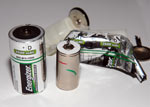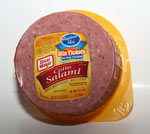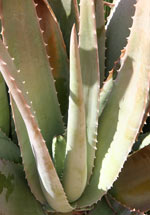|
Pomegranate and Blueberry Juice Consumer Shopping Guide
A NaturalNews PhotoTour by Mike Adams
|

 There is increasing concern today about the health effects of eating foods or drinking liquids packaged in plastic. Since most pomegranate juices are packaged in plastic bottles, this is a reasonable concern. (This picture shows a safer alternative: Glass bottles!) There is increasing concern today about the health effects of eating foods or drinking liquids packaged in plastic. Since most pomegranate juices are packaged in plastic bottles, this is a reasonable concern. (This picture shows a safer alternative: Glass bottles!)
The offending chemical usually cited in this context is bisphenol-A, a hormone mimicker. Many health experts believe that the rise on hormone-related cancers in western societies today is due, in part, to all of the synthetic hormone-like chemicals found in foods, drugs and packaging. Thus, if people are drinking pomegranate juice to help prevent prostate cancer, doesn't it seem contradictory that the juice would be packaged in plastic containers believed to contribute to prostate cancer?
The real answer, in my educated opinion, is found in the heat factor. Plastic releases more chemicals when it is heated. As a result, cooking foods in plastic may be extremely hazardous to your health, but eating liquids stored in cold plastic may, in fact, only expose you to a tiny fraction of the same chemicals. Although this is not a scientific number, here's a reasonable estimation: Food heated in plastic may generate 500 times the bisphenol-A contamination as food kept cold in plastic containers. Thus, cold plastic containers seem relatively safe.
But don't think you're safe yet! The real question here is: What was the temperature of the juice when it was poured into the plastic bottle at the manufacturing facility? For food safety reasons, it would make operational sense to flash-pasteurize the pomegranate juice and pour it into the bottles as quickly as possible, sealing them from possible bacterial contamination. If this is true, it would mean that high-temperature juice comes into contact with the plastic container, and this could be an opportunity for the release of bisphenol-A.
However, I am not a beverage production engineer, and I'm not familiar with the exact process used by juice bottling companies. In any case, regardless of the above, the safest containers are glass because they don't emit any bisphenol-A chemicals whatsoever. In fact, there's nothing harmful in glass, and it's the container of choice for health-conscious consumers.
Of course, glass breaks easily, and it's heavy. These two factors make plastic the obvious choice for cost-conscious companies who are mass-marketing their juices through the retail channels (grocery stores, etc.) But make no mistake: glass is the container of choice for health-conscious consumers.
Click NEXT to read the final wrap-up of this consumer guide...

 Want more PhotoTours like this e-mailed to you when they're available? Click here for free e-mail alerts. Want more PhotoTours like this e-mailed to you when they're available? Click here for free e-mail alerts.
Support NaturalNews by linking to this PhotoTour
Copy and paste the following HTML code into any web page:
|
This site is part of the NaturalNews Network ©2004,2005,2006,2007,2008 All Rights Reserved. Privacy | Terms
All content posted on this site is commentary or opinion and is protected under Free Speech. Truth Publishing
International, LTD. has full ownership of and takes sole responsibility for all content. Truth Publishing
sells no health or nutritional products and earns no money from health product manufacturers or promoters. The information on this site is provided for educational and entertainment purposes only. It is not intended as a substitute for professional
advice of any kind. Truth Publishing assumes no responsibility for the use or misuse of this material.
Your use of this website indicates your agreement to these terms and those published here. All trademarks, registered trademarks and servicemarks mentioned on this site are the property of their respective owners.
|
|
Next:


See More
Astonishing Photos:

Energizer batteries exposed!


Mystery Meat Macrophotography (gross!)

How to harvest fresh aloe vera gel (step by step)
|
|




